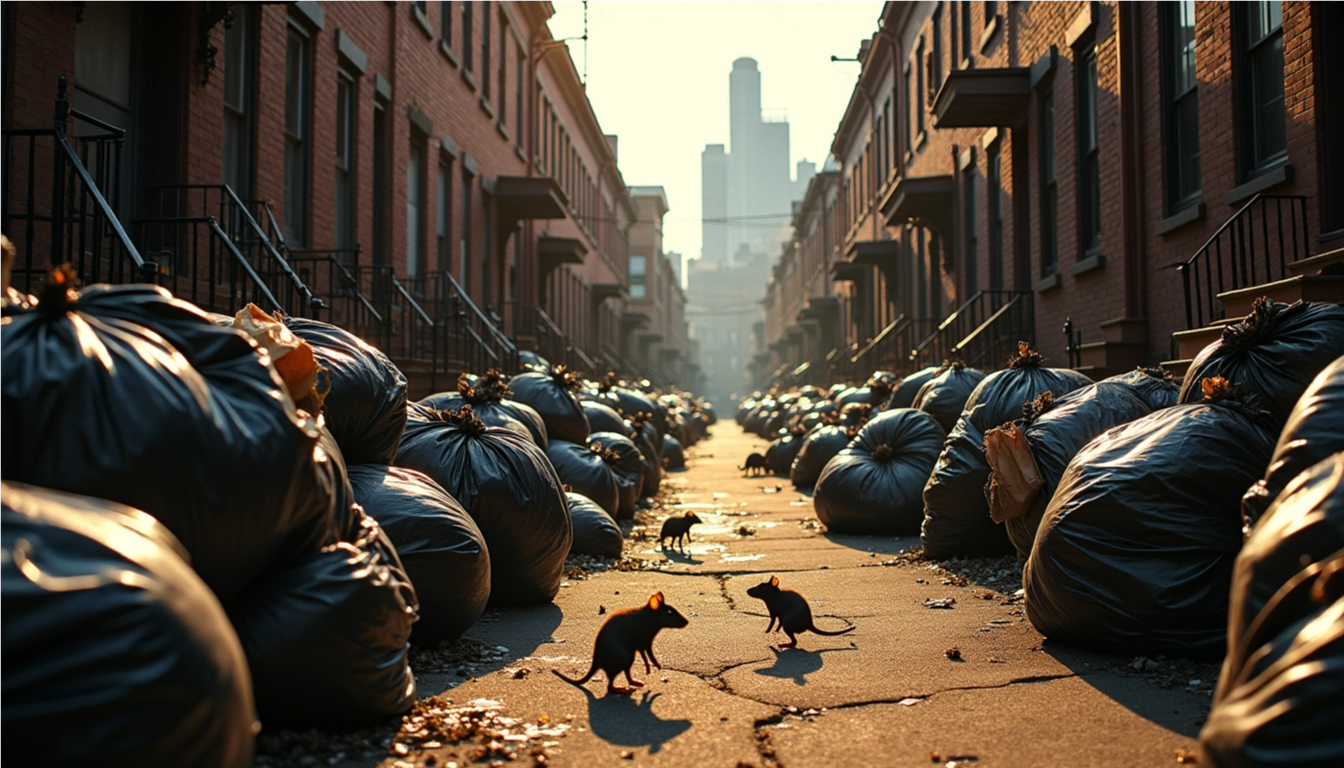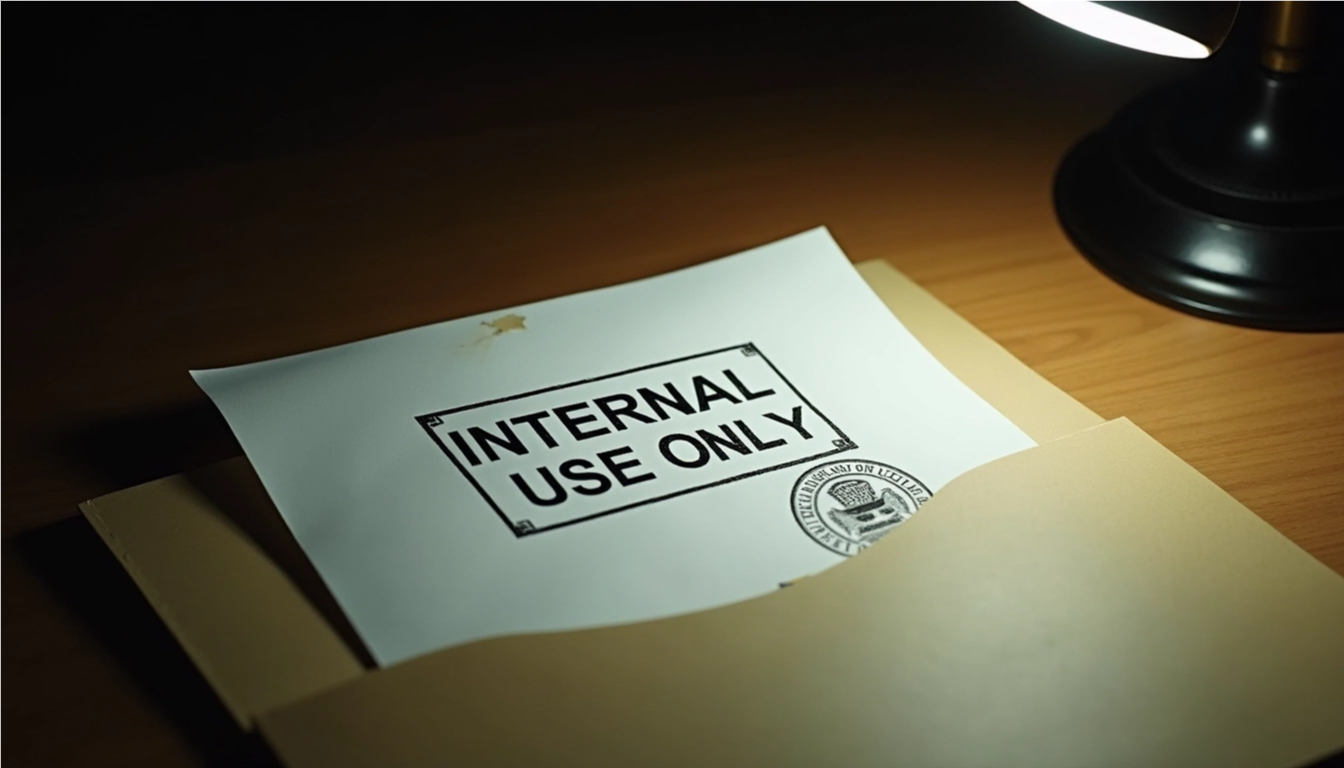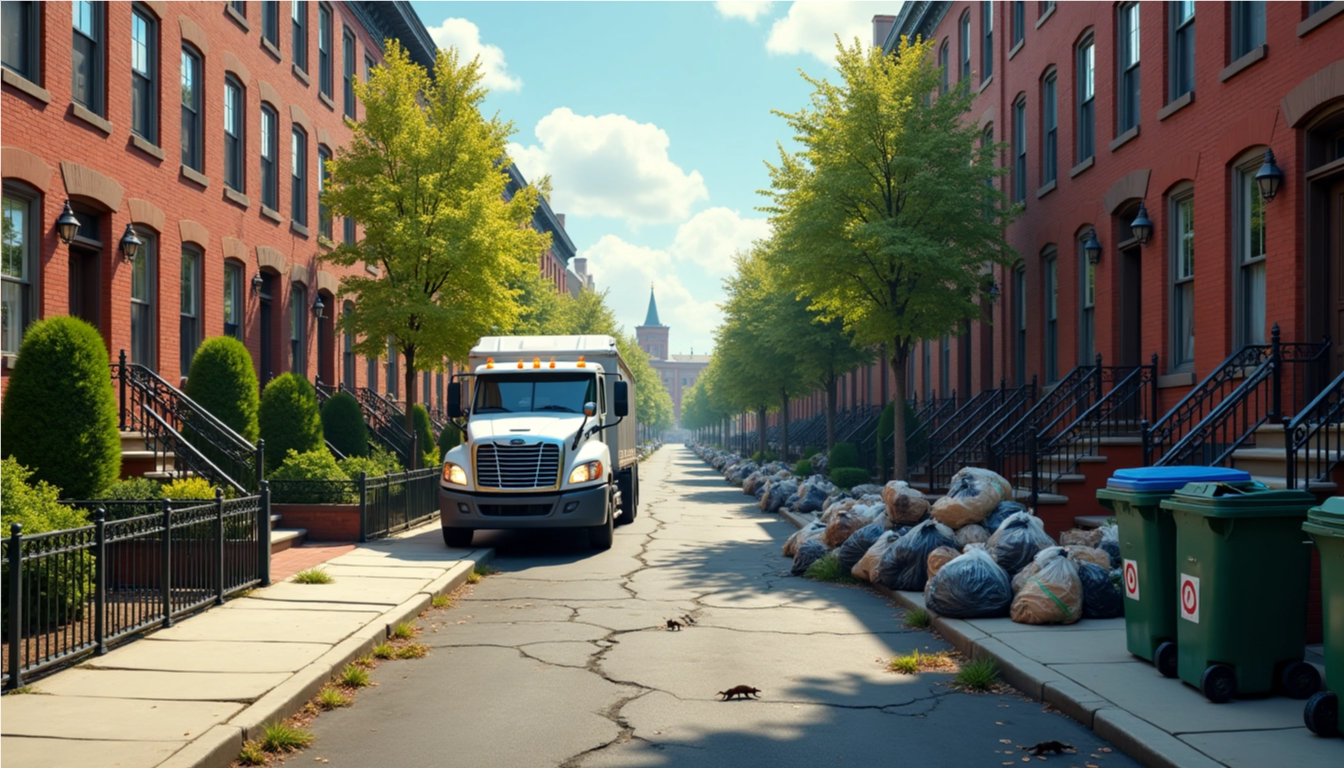The Waste Wars: The Strike Card
How a newcomer's clean business model is threatening to upend decades of mob-controlled garbage collection.
South Philly’s garbage game has always been PhilWaste’s territory — rough trucks, rougher men, and a silent understanding that the streets stay theirs. But a shiny new competitor, GreenLine Waste Services, just rolled into town with polished rigs and promises of cleaner, cheaper pickups. To the city, it looks like healthy competition. To the Marcuccios, it’s a threat to decades of control. Behind the trash routes and union chatter, tensions are rising… and not everyone’s walking away from these “business talks” unscathed.
There’s a particular smell when garbage starts to back up in this city.
If you grew up here, you know it. It’s not just the sour rot of food scraps and coffee grounds—it’s the damp paper pulp, the diesel soot clinging to plastic bags, the faint ammonia from dumpsters that haven’t been scrubbed since the Flyers won their last Stanley Cup.
It takes about three days without regular pickup before that smell starts whispering through alleys and stairwells. A week, and it’s inescapable.
And according to a memo I obtained this week, city officials are bracing for exactly that scenario.
The Leak
The memo, stamped INTERNAL USE ONLY, is dated July 28 and comes from the Office of Sanitation Services. It outlines “service disruption contingency plans” in the event of “labor-related interruptions affecting current contract holders.”
The language is careful—no mention of a strike, no names. But read between the bureaucratic lines and it’s obvious: the city is preparing for PhilWaste to stop rolling.
The trigger? Their ongoing battle with GreenLine Waste Services.
The Plan Behind the Scenes
I’ve been told by two separate City Hall sources that negotiations between PhilWaste and the sanitation workers’ union have turned icy. Officially, the sticking point is “route protection.” Unofficially, it’s about keeping GreenLine out.
If the union walks—and if PhilWaste lets them—pickups across the city would halt overnight.
The memo anticipates “selective continuity” in service. That means certain areas, mostly high-priority zones like hospitals, universities, and government facilities, will still see regular pickups. How? Through “alternative contracted services.”
I checked those “alternatives” against the list of GreenLine’s existing clients. The overlap is almost perfect.
Winners and Losers
What this means in practice is simple: if you’re part of the city’s economic and political core, you’ll still see the trash truck roll down your block. If you’re not, your garbage is going to sit.
Imagine that for a second.
By day three, the alleys behind rowhomes are impassable. By day five, the rats move in. By day seven, you start seeing code enforcement padlock corner stores and restaurants for “health violations” they couldn’t avoid.
And all the while, the neighborhoods that matter to the city’s donors and dealmakers stay clean.
It’s selective suffering, designed to put pressure on both the public and City Hall to make the problem go away—fast.
Pressure in Public View
Up until now, the PhilWaste–GreenLine fight has been mostly invisible to people outside the trade. Some vandalized trucks here, a flipped dumpster there—stories you hear if you’re paying attention, but nothing that leads the evening news.
A strike changes that.
Nothing is more visible than trash piling up on a hot August day. Nothing travels faster on social media than photos of overflowing bins and rats running through city streets.
And nothing puts a mayor on the defensive faster than reporters asking why his wealthiest constituents aren’t dealing with the same stench as the rest of the city.
The Escalation Curve
Here’s what my sources in both the sanitation union and GreenLine’s management tell me to expect if PhilWaste plays the strike card:
Union Walkout – Crews stop pickups, citing “unfair route encroachment.”
Selective Continuity – GreenLine fills the gaps for high-value clients, keeping their image spotless.
Public Outrage – Neighborhood associations demand action; photos flood the news cycle.
Backroom Negotiations – City Hall leans on GreenLine to slow expansion in exchange for the strike ending.
Status Quo Restored – PhilWaste keeps the majority share; GreenLine gets limited growth but enough to claim victory.
It’s a power play, pure and simple.
Why Now?
PhilWaste has weathered competition before. Small haulers have come and gone, often swallowed up within a year. So why go nuclear on GreenLine?
Two reasons:
GreenLine isn’t playing the old game. They aren’t trying to sell themselves to PhilWaste or cut backroom deals. Their funding is clean, their contracts airtight, and their PR machine knows how to work a camera.
Routes equal leverage. Every route GreenLine takes is a piece of political currency PhilWaste can’t spend. Lose enough of them, and you stop being the biggest player at the table.
The Union Factor
The sanitation workers’ union is the key lever here. Without them, PhilWaste’s trucks don’t move.
I’ve spoken to two union stewards and one rank-and-file driver in the last week. They’re not shy about where their loyalty lies.
“GreenLine’s got nice trucks,” one driver told me. “But they don’t put food on my table. PhilWaste’s been signing my checks for fifteen years. I’m not crossing them for some out-of-town company.”
When I asked what he’d do if told to walk out, he shrugged. “We’re ready. Just say the word.”
Signals from GreenLine
GreenLine, for their part, is projecting confidence. Their VP of Operations told me in an on-the-record call, “We believe in fair competition. If a strike happens, we’ll continue to serve our clients and explore opportunities to expand coverage where it’s needed.”
Translation: if PhilWaste shuts down, GreenLine’s trucks will be ready to roll—at least for those who can afford them.
City Hall on Edge
A source close to the mayor’s office admitted there’s “concern about optics” if a strike goes forward and only certain neighborhoods get service.
“That’s a political nightmare,” the source said. “It feeds every narrative about this city being run for the few at the expense of the many.”
When I asked what the mayor would do to stop it, the source hesitated. “Sometimes, it’s not about stopping it. It’s about ending it quickly and making sure the right people come out ahead.”
The Road Ahead
Whether the strike happens next week, next month, or not at all, the message has been sent: in Philadelphia, garbage is more than waste. It’s leverage. It’s a bargaining chip. It’s a weapon.
And when the people holding that weapon decide to use it, the rest of us live with the consequences—one overflowing dumpster at a time.
If you wake up to find your block hasn’t been serviced in days, know that it’s not an oversight. It’s a signal.
The question is, to whom?
Stay vigilant,
Will Ryland





